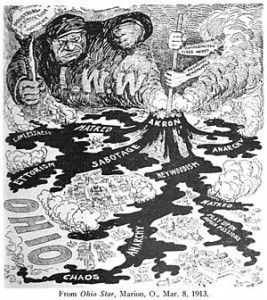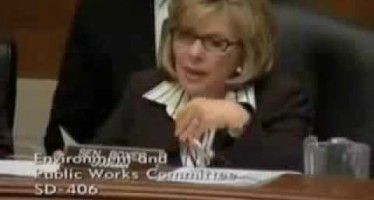Reform for California only a vote away
Oct. 30, 2012
By Katy Grimes
Anyone who still has the hope of reforming California knows that it must begin with the political system. Far too many politicians in California are so heavily influenced by big money that constituents seem to be nothing more than an afterthought and a group to pander to for political advertisements.
For many years politicians have sought political contributions from corporations and unions, then voted the way those special interests ordered.
And, unfortunately, too many politically ambitious Republicans have gone along with the big-government party plan instead of thwarting the political dominance from unions and big corporations.
The only way to begin real reform in the Golden State is to neuter the money influences. Proposition 32, the “Paycheck Protection” ballot initiative, could begin the reform process.
Big bucks spending
Prop. 32 would end the questionable practice of the automatic deduction of funds from employee paychecks for political purposes; would end union and corporate contributions to political candidates; and would end government contractor contributions to elected officials. The prohibition applies to labor unions and corporations, as well as to government contractors.
In only the last 10 years, the California Teachers Association, the Service Employees International Union, and the California State Employee Association, have spent hundreds of millions of dollars on lobbying and political contributions, according to the Fair Political Practices Commission. Prominent members of the FPPC’s “Billion Dollar Club,” the CTA, a public employee union, spent $211.9 million, and the SEIU spent $107.5 million.
Between 2000 and 2010, the CSEA spent $31.8 million and the California Correctional Police Officers Association spent $32.4 million. Both are public employee unions.
From the private sector, Pharmaceutical Research and Manufacturers of America spending came in at $104.9 million between 2000 and 2010, the California Hospital Association spent $43.2 million, and the California Chamber of Commerce spent $39 million.
Utilities spent a great deal of ratepayer money as well: PG&E spent $69.3 million, AT&T $59.6 million and Southern California Edison $43.4 million.
The Morongo Band of Mission Indians spent $83.6 million, the Pechanga Band of Luiseno Indians spent $69.3 million, and the Agua Caliente Band of Cahuilla Indians spent $49 million. There were three additional bands of American Indians that spent a combined $77 million.
The California Realtors Association spent $33.3 million. Even the trial lawyers association spent $21.3 million between 2000 and 2010.
Local political spending
The shocking spending increase in local political races should prove that the big political spenders think that local races matter even more than local voters do.
In 2010, a friend of mine ran for the Sacramento City Unified School District Board of Directors. She was eminently qualified for the position. What should have been a local grassroots campaign turned into a dogged political battle when the AFL-CIO gave her opponent $30,000. She lost to union power.
I recently reported on the three Charter City initiatives on the November ballot. Escondido, Costa Mesa, and Grover Beach, currently general law cities under the California Constitution, are asking voters to allow the important change to charter cities.
Currently, California’s 121 charter cities have the authority to determine their own policies concerning their municipal affairs. Some cities have used the charter more wisely than others. The three cities vying for charter approval plan to use the new charters to circumvent overbearing state mandates requiring that they pay prevailing union wages on public projects.
But the labor and public employee unions aren’t going to allow this to become law without a fight.
In the Costa Mesa charter city battle, the “Taxpayers for Open and Accountable Government,” a group largely funded by the Orange County Employees Association, already has spent $360,000 to defeat the measure. Kevin Dayton, with Labor Issue Solutions, broke the contribution down:
* $274,634 from the Orange County Employees Association;
* $20,000 from the Orange County Professional Firefighters Association;
* $10,000 from the California Federation of Teachers;
* $5,000 from the Orange County Labor Federation AFL-CIO;
* $5,000 from the United Nurses Associations of California/Union of Health Care Professionals.
Dayton reported that $110,000 has been collected by “Committee for Costa Mesa’s Future,” which is sponsored by labor unions. In fact, Dayton found that all of the $110,000 came from the California Construction Industry Labor-Management Cooperation Committee.
And $8,229.30 has been spent by “Costa Mesans 4 Responsible Government” against Costa Mesa’s Measure V. This big labor organization has collected a total of $39,439.67, according to Dayton. “Besides opposing Measure V, this group is trying to get a slate of three pro-union, anti-charter candidates elected to replace three fiscally responsible, pro-charter incumbent city council members,” Dayton reported.
Prop. 32’s lofty goal
Should Prop. 32 pass, the current pay-to-play, “money-in, favors out” system will largely end, and unions will be neutered monetarily. Employees should be able to decide where their vote and political contributions go, instead of by a union boss or board of directors.
The fight may not be a new one. But it’s clear that unions have outlived their usefulness. Today unions are only political money laundering machines.
Related Articles
Protectionist Babs?
John Seiler: During the Carly Fiorina-Barbara Boxer debate Wednesday, Babs charged: When she was CEO of Hewlett-Packard, before she was
SD GOP Snubs Pro-Union Candidate
Steven Greenhut: The San Diego Republican Party gave its support for mayor to Carl DeMaio, the pension-reforming, no-nonsense conservative, over
VFW endorses "Don't Call Me M'am" Boxer?
Katy Grimes: Yesterday, Democrat Senator Barbara Boxer, running in the fight of her life for reelection to the U.S. Senate,






